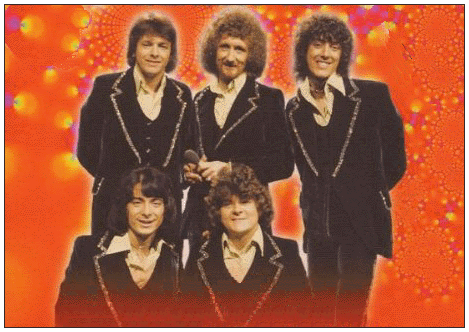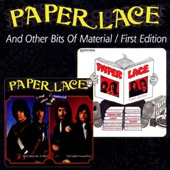|
"The Night Chicago Died" Paper Lace Mercury 73492 August 1974 Billboard: #1
In 1974, with rhythm guitarist Carlo Santanna (born June 29, 1947, in Rome) added, Paper Lace appeared on Opportunity Knocks, a talent show broadcast on the BBC's rival, ITV. The group won first place. Watching their victory at home on television was Connie Callander, wife of writer/producer Peter Callander. She told her husband about the group, and along with his partner, Murray, set up an audition at their studio for Paper Lace. Murray and Callander had half-completed a tune they wanted to record, and were looking for a group to cut it. It was a story-song, much like the number seven hit they wrote for Georgie Fame in 1968, "The Ballad of Bonnie and Clyde." The song was "Billy, Don't Be a Hero." "The Night Chicago Died" followed in the story-song tradition. "Our research was a little bit slipshod," Murray admits. "We had a good example of bad research working will for us with 'Bonnie and Clyde.' We had 'dulap' bag instead of 'burlap' bag." A similar problem plagued "The Night Chicago Died." "We wrote this fictional story about Al Capone and his men having a shoot-out with the police, which of course never happened. And we used the phrase 'the East side of Chicago.' They claim there is no 'east' side of Chicago. There's an east side of everything!" "The Night Chicago Died" only reached number three in Britain, even though it was specifically written for domestic consumption. "Our song was written for the English market," Murray says. "If you sit down and try to write an international hit, you get nowhere." Once the record was a hit in America, the band's manager had a clever promotional idea. He thought. "The manager of the group naively wrote to Mayor (Richard) Daley, hoping that he was going to get congratulated...and when the boys went to the States they'd have a civic reception," Murray recalls. Instead of the key to the city, the group received what Murray terms "a rather rude letter." The Mayor ended it with, "And one more question...are you nuts?" Paper Lace's American career ended seven months after it began. The follow-up to "The Night Chicago Died" was called "The Black-Eyed Boys," which peaked at number 41. Soon after, the group listened to some bad advice and broke their contract with Murray and Callander's Bus Stop Records, hoping to get a large advance from another label. Lawsuits and countersuits ensued, with the band the loser in an out-of-court settlement. - Fred Bronson, The Billboard Book of Number One Hits, Billboard, 1988.
No comments so far, be the first to comment. |


